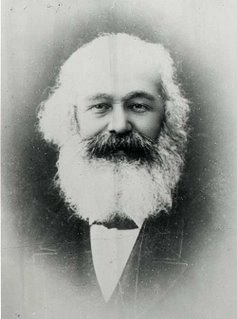 Marx and Secularization: The political philosophy of Karl Marx can be considered one of the most powerful forces of secularization in nineteenth-century European society. It essentially instructed people to become materialists. Belief in the hereafter was a means of social control; an "opiate of the masses." As a member of the Young Hegelians, he devoutly adhered to the basic tenets of Georg Hegel's philosophy of history. Marx believed that history could be understood as a rational progression, and thus, it could also be explained scientifically. He even went so far as to claim that his political philosophy was scientific in the sense that it applied the Hegelian dialectic to social concerns. In fact, Marx asserted that the growing industrial proletariat represented a thesis and the ruling capitalist bourgeoisie signified its anti-thesis. Therefore, according to the Hegelian dialectic, which deemed all historical events as inevitable by their very nature, these two social classes were bound to clash and form a synthesis: classless society. The resulting utopian society would effectively encompass the elements of basic communism where everyone's fundamental interest resided in economics. However, such a society could only be formed after many years of tension between the proletariat and the bourgeoisie. This tension would have at least brought about the means of production to sustain a communal society. In short, Marx would have never considered Russia as an appropriate setting to have the first communist revolution.
Marx and Secularization: The political philosophy of Karl Marx can be considered one of the most powerful forces of secularization in nineteenth-century European society. It essentially instructed people to become materialists. Belief in the hereafter was a means of social control; an "opiate of the masses." As a member of the Young Hegelians, he devoutly adhered to the basic tenets of Georg Hegel's philosophy of history. Marx believed that history could be understood as a rational progression, and thus, it could also be explained scientifically. He even went so far as to claim that his political philosophy was scientific in the sense that it applied the Hegelian dialectic to social concerns. In fact, Marx asserted that the growing industrial proletariat represented a thesis and the ruling capitalist bourgeoisie signified its anti-thesis. Therefore, according to the Hegelian dialectic, which deemed all historical events as inevitable by their very nature, these two social classes were bound to clash and form a synthesis: classless society. The resulting utopian society would effectively encompass the elements of basic communism where everyone's fundamental interest resided in economics. However, such a society could only be formed after many years of tension between the proletariat and the bourgeoisie. This tension would have at least brought about the means of production to sustain a communal society. In short, Marx would have never considered Russia as an appropriate setting to have the first communist revolution.
Monday, November 27, 2006
Marx and Secularization
 Marx and Secularization: The political philosophy of Karl Marx can be considered one of the most powerful forces of secularization in nineteenth-century European society. It essentially instructed people to become materialists. Belief in the hereafter was a means of social control; an "opiate of the masses." As a member of the Young Hegelians, he devoutly adhered to the basic tenets of Georg Hegel's philosophy of history. Marx believed that history could be understood as a rational progression, and thus, it could also be explained scientifically. He even went so far as to claim that his political philosophy was scientific in the sense that it applied the Hegelian dialectic to social concerns. In fact, Marx asserted that the growing industrial proletariat represented a thesis and the ruling capitalist bourgeoisie signified its anti-thesis. Therefore, according to the Hegelian dialectic, which deemed all historical events as inevitable by their very nature, these two social classes were bound to clash and form a synthesis: classless society. The resulting utopian society would effectively encompass the elements of basic communism where everyone's fundamental interest resided in economics. However, such a society could only be formed after many years of tension between the proletariat and the bourgeoisie. This tension would have at least brought about the means of production to sustain a communal society. In short, Marx would have never considered Russia as an appropriate setting to have the first communist revolution.
Marx and Secularization: The political philosophy of Karl Marx can be considered one of the most powerful forces of secularization in nineteenth-century European society. It essentially instructed people to become materialists. Belief in the hereafter was a means of social control; an "opiate of the masses." As a member of the Young Hegelians, he devoutly adhered to the basic tenets of Georg Hegel's philosophy of history. Marx believed that history could be understood as a rational progression, and thus, it could also be explained scientifically. He even went so far as to claim that his political philosophy was scientific in the sense that it applied the Hegelian dialectic to social concerns. In fact, Marx asserted that the growing industrial proletariat represented a thesis and the ruling capitalist bourgeoisie signified its anti-thesis. Therefore, according to the Hegelian dialectic, which deemed all historical events as inevitable by their very nature, these two social classes were bound to clash and form a synthesis: classless society. The resulting utopian society would effectively encompass the elements of basic communism where everyone's fundamental interest resided in economics. However, such a society could only be formed after many years of tension between the proletariat and the bourgeoisie. This tension would have at least brought about the means of production to sustain a communal society. In short, Marx would have never considered Russia as an appropriate setting to have the first communist revolution.
Subscribe to:
Post Comments (Atom)
No comments:
Post a Comment